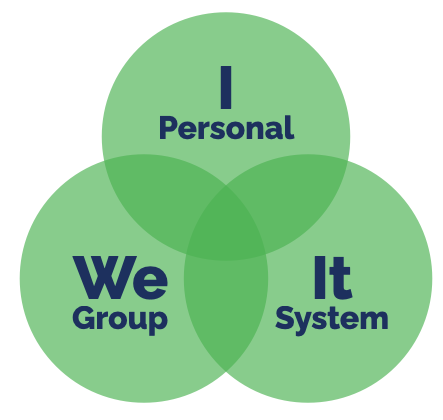Innovation Work
Innovation work is now something we all need to perform. Innovation is so fundamental to not just growing a business, but also ensuring it stays relevant and viable. Disruption is potentially all around us and because we have previously been successful is not guarrantee it will continue.
It is no longer adequate to have a specially selected group of people working on innovation, rather our new work environment demands that all workers actively pursuing new ways of working. In other words, that we all need to do regular innovation work.
Drucker and The Knowledge Worker
Back in 1959, Peter Drucker coined the term ‘knowledge worker’. It refers to a shift from physical or manual work to mental or knowledge work.
While this remains a dominant management idea, it needs an upgrade to suit our current era of digital technology and global competition. In particular, we need to upgrade our framework for knowledge work to include ‘innovation work’ and ‘innovation workers’.
What is Knowledge Management?
It follows that if we’re all knowledge workers, then the role management must include the management of this key resource: knowledge. It makes sense then that knowledge management would become one of the dominant paradigms for business today.
This interest has been fueled by the shift from physical capital, as in buildings and equipment to intellectual or knowledge capital. The intention of knowledge management is to maximize the sum total of knowledge inside an organization to improve business competitiveness.
Knowledge Management Flaws
There are several flaws in this viewpoint.
- That we can capture knowledge in some way.
- We can manage knowledge.
- Knowledge rapidly becomes obsolete and outdated.
Also, in times of rapid change and decreasing product life cycles, knowledge rapidly becomes obsolete. It follows that managing knowledge needs to be replaced by generating new knowledge. When you generate new knowledge coupled with effective action, you produce new results through innovation. Innovation work is the key to increase competitiveness, not knowledge.
The Missing Piece around Knowledge Work
While these things are important, there is a missing piece here around knowledge work that is even more significant
Knowledge is insufficient for effective action.
The first two points are based on our bias towards technological solutions. At a simple level, it treats knowledge like files on a computer that can be stored and accessed. But the third point has deeper implications because it based on a fundamental human problem:
How many times have you known what needs to be done and not done it?
Ultimately, what is missing is wisdom. Wisdom is knowing what needs to be done and doing it when it needs to be done. This flaw is not about knowing, it’s about doing. Jeffrey Pfeffer called this the ‘knowing-doing gap’.
This gap is not in our knowledge. It’s in our emotions.
Emotional Spaces and Innovation Work
The emotional space we find ourselves is a key factor in whether we translate our knowledge into effective action.
While we mostly experience our emotions as reactions to events that happen to us, neuroscience is now telling us that our emotions are actually responses to how we need to act in the future. For instance, if you feel threatened in any way you will be triggered to experience freeze, flight or fight that corresponds with feelings of fear or anger.
In terms of innovation work, when we experience the ‘wrong’ emotions, we fail to innovate.
An important point here is that our emotions are not good or bad by themselves. All emotions, including anger are useful – as long as we use them in the right situations. A ‘wrong’ or ‘not useful’ emotion is merely the wrong choice of emotion for that task. For instance, being angry is not going to be useful if you want to encourage your four-year old to go to sleep. Likewise, being compassionate is not likely to be helpful when confronted by a lion or bear that is about to maul you.
Obsolete Knowledge
The overarching problem of traditional innovation is the focus on a top down approach to transforming the company.
Typically, the elite managers design the future of the organization and then impose it upon their employees. While the organization may be proactive to change, the individual is placed in a position where they are faced with responding to the changes forced upon them.
The change management model struggles on the face of these reactionary forces. Research by McKinsey and Co suggest upto 70% of change management projects fail to reach their objectives.
Top down change also focuses on transforming everything and fails to conserve the things that work. Knowing what to conserve and what to transform is a critically important part of innovation work.
The I-We-It Model

- I = the subjective world of the individual that focuses on purpose, self-knowledge, self-correction, and persistence.
- We = the subjective collective view of the group that focuses on relationships, communication, leadership and inspiration.
- It = is the objective world of nature that focuses on processes technology, systems, measurement and statistics.
Traditional innovation processes focus on the ‘It’ – the overall system, processes and technology. The ‘I’ and the ‘We’ are usually ignored.
This scenario is evident in the phrase ‘if only we had the money to buy it’. In the old world of the industrial economy, buying new equipment was the simplest way to increase productivity and take more effective action. Today, this is insufficient.
In the new economy, where the most powerful resource of any organization is the knowledge, expertise and wisdom of its people, the ‘I’ and the ‘We’ become the domains in which the biggest gains from innovation and improved performance can be achieved.
Bottom Up Innovation
A corresponding bottom up innovation process can inspire your team and your daily activity and grow your business from opportunities identified and generated within your organization. The key is to stop trying to manage knowledge because you can’t. Knowledge is always changing. Plus, you never know if a knowledge worker is working anyway.
Instead, start managing innovation work because you can see and touch the added value it creates for your customers.
Innovaton Work and the Response to Change
Innovation is about change – deliberately and consciously creating change.
When we have change imposed upon us, we typically resist it. This is a costly breakdown for businesses as a great deal of money is spent on change management – and one part of why change management processes typically fail.
In contrast, when you work with innovation in the workplace as part of your ongoing responsibilities, you train yourself to deal with change in a new way.
The opportunity is to improve your business performance through more effective action and simultaneously improve your ability to respond to the demands of the ever changing marketplace.
Innovation work as a learning process
Innovation is also about learning – learning what works better, and applying it in new ways. In particular, when we view it through the ‘I’ of the personal space and the ‘We’ of the collective space.
The personal space for innovating:
- What is my personal way of being that allows me to perform at my best?
- How do I manage change?
- What are the things that stop me from performing at my best?
When the ‘I’ learns the individual grows and what they can offer to the organization grows also.
Learn about the collective space for innovating, what relationships, moods and conversations need to be had by your group to perform at their best.
- How does your group manage change?
- What collective moods stop your group from being at their best?
- What cultural conversations stop your group from being at their best?
When the ‘We’ or the group learns the group grows, the customer receives extra benefits, and the organization becomes more effective.
Introducing the Innovation Worker
In the 1960s, Peter Drucker coined the term the knowledge worker to highlight the shift from work that was primarily physical to work that requires personal knowledge and expertise.
Today, it is insufficient to simply be knowledgeable, one must also take effective action.
A more appropriate term for today is the innovation worker.
An innovation worker provides added customer value and an ongoing competitive advantage for the organization through generating new knowledge and more effective action.
Creating Innovative Spaces
Inside this framework, the role of the manager is to create and maintain innovative spaces that allow more effective action to take place.
This becomes the key not only to create new and more effective ways of adding value to customers, it also becomes the key to managing the effect of external change on employees, and ultimately, employee motivation and performance.
To be more innovative across your entire organisation is not about the technology, the physical things or the ‘It’.
Innovation happens in the minds of the individual and the interactions of groups and this is heavily determind by our emotional spaces for engaging in change and learning.
The real value of this is that it can be applied in almost any situation. So you don’t need to be part of a big organization. Or you could be part of a small or you could be a solo operator.
The two key questions to ask yourself are:
- What is the emotional space you’re in today? (Right now?)
- How are you relating to the people that you’re coming into contact?
Fundamentally, innovation work comes down to learning. What are you learning today?
 In this Podcast Episode
In this Podcast Episode
In this episode of the Ideas Architect podcast we look at innovation work, innovation workers and creating spaces for innovation. In particular we consider the importance of emotions, moods and relationships from the individual and group perspective. Plus, we discuss the changing role of technology in helping and hindering innovation.
Listen, Download, Share
Podcast: Play in new window | Download | Embed
Subscribe: RSS


 In this Podcast Episode
In this Podcast Episode

